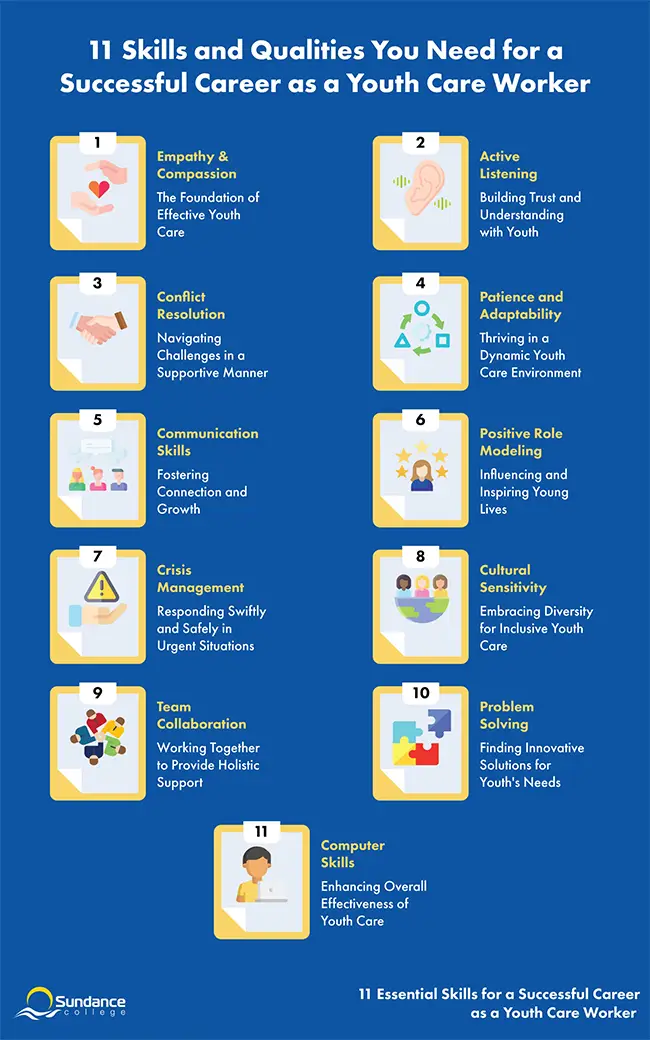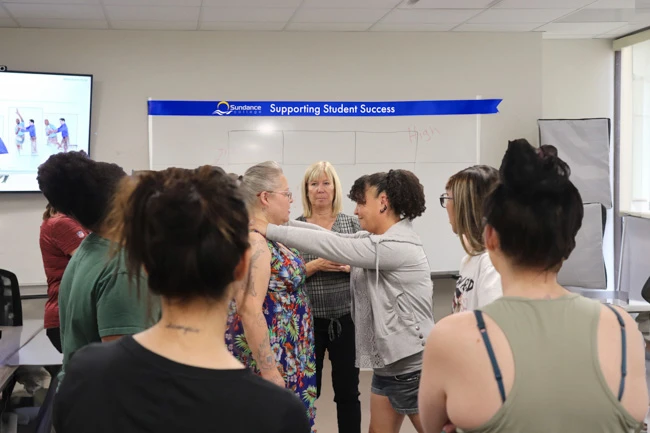Blog / What Makes a Good Youth Care Worker? Here Are 11 Skills That Really Matter
What Makes a Good Youth Care Worker? Here Are 11 Skills That Really Matter

Addictions and Community Health Professional Diploma
- Addictions Worker
- Youth Support Worker
- Family Support Worker
- Drop-in Centre Worker
Table of Contents
Life, as we know it, isn’t always a smooth ride along a sunlit path. It’s more like a roller coaster, with its ups and downs. For some, the harsh realities of life dawn far too early. While some kids are playing, swimming, and dreaming big, others are dealing with tough stuff like depression, having family problems, or even getting into trouble.
The regular school system, despite its best efforts, isn’t always equipped to deal with the unique needs of at-risk youth. That’s where other specialized programs, community outreach, and dedicated youth care workers step in, serving as reliable anchors and guides for these young people.
As a youth care worker, you get to make a meaningful difference in the lives of young people and their families. It is an incredibly rewarding job but also one that requires you to have dedication and passion as well as certain skill sets that allow you to do your best work.
If it is something that interests you, read on for 11 key skills needed to be a successful youth care worker and how they can help prepare young people for adulthood and support them during difficult times.
At the end of the article, you can find the success story of one Sundance College graduate Frieda V., the Addictions and Community Health Professional, who advanced her career through education, dedication, and a desire to help others.
The Role of a Youth Care Worker
Youth care workers are often the unsung heroes who provide crucial support and guidance to young individuals who’ve faced hardships. Youth care workers are there to listen, empower, and resolve the problems of at-risk youth.
They’re like mentors, offering youth support for issues with:
- Mental health and well-being
- Healthy development
- Life skills
- Social adjustment
- Academic challenges
- Emotional, social, and behavioral disorders
- Drug and alcohol use/abuse
They watch for changes in their clients’ behavior and jump in when needed. Furthermore, youth care workers can take part in analyzing social programs and evaluating their effectiveness. They also provide testimony in legal cases.
You can find a youth care worker in workshops that build kids’ skills and activities in order to boost their self-esteem; in group discussions that create a sense of community; collaborating with therapists, educators, and others to provide the best care.
Youth care workers usually work in places like residential facilities – homes for troubled youth needing care around the clock. Also in schools, supporting students with tough emotions. And in community centers, guiding young people who lack support.
11 Skills and Qualities You Need for a Successful Career as a Youth Care Worker

To reveal the key youth care worker qualities and skills, we turned to Jeremiah Arkell, one of our experienced Addictions and Community Health Professional (ACHP) instructors. Jeremiah brings a unique perspective to each skill, offering explanations that bridge the gap between theory and practice.
1. Empathy And Compassion
ACHP instructor Jeremiah highlights that “empathy and compassion are the cornerstone of effective youth care”.
It means that when approaching at-risk young people, skilled youth care workers always need to provide genuine care. They should listen, creating a safe haven for teens’ thoughts. They shouldn’t rush to fix things. Instead, they need to validate their youths’ feelings, making them feel understood. This simple act lays the foundation of trust. In a conversation, youth care workers can open up about their own life challenges, showing youngsters a path forward. This shared vulnerability brings them closer, encouraging the young people to start sharing their dreams and fears.
Compassion and empathy in youth care serve as tools for building deep connections between care workers and young individuals. For a successful career as a youth care worker, you need to master this skill.
2. Active Listening
How does this skill manifest itself in action? And how will mastering it help you become a good youth worker?
As teens talk about their struggles and fears, a youth care professional should focus solely on them. They need to listen with full attention, offering no distractions. By doing so, they show young people that their thoughts matter. The care worker’s nods and verbal cues need to show teens that they’re truly engaged and validate youth’s concerns.
Through active listening, skilled youth care workers acknowledge troubled teens’ experiences without judgment, creating an environment of acceptance.
Jeremiah, ACHP instructor, emphasizes how active listening for youth care goes beyond words: “Active listening not only builds trust but also allows youth workers to truly understand the underlying issues the youth are facing and provide effective support.”
3. Conflict Resolution

Often, troubled teens experience conflicts. In these situations, a youth care worker takes on the role of a mediator. They help young people express their concerns while promoting a safe space for open communication. Thanks to youth care worker’s mastery of conflict resolution techniques, constructive conversations become possible.
However, the role of a youth worker isn’t just about ending disputes; it’s about fostering understanding. They need to ensure both parties listen to each other, validating their feelings. By teaching both sides of a conflict to see things from different perspectives, a youth care professional empowers them to find common ground.
Our ACHP instructor Jeremiah notes that “a youth care worker often acts as a mediator, guiding young individuals through their conflicts. They teach young individuals to navigate disagreements while preserving respect.”
4. Patience And Adaptability
While navigating a whirlwind of emotions, some young people can often test youth workers’ patience. Experienced care professionals know that understanding young individuals requires time. So, they patiently wait for teens to open up, creating a space where they can feel safe to share.
As days unfold, young people’s emotions will ebb and flow. Here is where youth care workers’ adaptability can shine. They need to remain steadfast, ready to support youth as they navigate the ups and downs of their journey. The calm demeanor of a youth care worker can send the message to the youth in care that their emotions are valid and understood.
By nurturing patience, youth care workers foster trust. Through adaptability, they become a pillar of support, embracing the fluidity of young people’s emotions.
“Young individuals are constantly evolving. Patience and adaptability in youth care help workers understand and guide at-risk youth properly as well as ensure they’re prepared for whatever challenges come their way”, ACHP instructor Jeremiah explains.
5. Communication Skills
Often, at-risk teenagers come to the care workers because they have lost their way in life and are seeking guidance. As they share their worries, youth care workers’ communication skills come into play. Professionals in youth care should listen actively, showing they comprehend the feelings of young individuals. With empathy, they need to respond, ensuring teens know they’re heard and understood.
Youth care workers’ ability to express themselves clearly is critical. They need to provide guidance and feedback in ways that resonate with young individuals. Through skillful expression, a youth care professional can foster a connection. Through meaningful guidance, they can empower teenagers to overcome challenges.
As ACHP instructor Jeremiah says, “Communication skills for youth care workers are not just about talking; it’s about connecting. It’s about understanding, offering feedback, and giving directions in a manner that’s compassionate and clear.”
6. Positive Role Modeling
As a youth care worker, you are always being observed by the youth you interact with during your shift. The healthy behaviors and attitudes you model become a silent but powerful lesson.
In observing you, young people find themselves inspired to adopt similar positive traits in their own lives. They can start making healthier choices and setting goals. Through their youth workers’ actions, they can learn that change is possible.
“By being a good example,” Jeremiah, ACHP instructor confirms, “youth care workers can significantly impact young lives, silently inspiring young souls to embrace their potential and strive for greatness.”
7. Crisis Management

See how the Non-Violent Crisis Intervention (NVCI) training at Sundance College’s Edmonton campus is taking place on our Instagram.
Sometimes, teens’ traumas can resurface, triggering severe anxiety, panic attacks, and other crisis situations. In this case, experienced youth care workers need to approach teens calmly, maintaining eye contact to convey their presence and support.
Once they recognize the signs of panic, they immediately start using techniques to help regulate breathing. They guide teens through deep breaths, setting a slow and steady rhythm. As panic subsides, youth workers ensure their patients are in a safe space and often sit down beside them. They listen attentively as young individuals express their fears and worries, providing reassurance that they’re not alone.
ACHP instructor Jeremiah underscores the significance of crisis management in youth care: “A youth care worker’s ability to act swiftly, stay composed, and provide immediate support is crucial, especially in an environment where emotions can run high.”
8. Cultural Sensitivity
“In today’s diverse world, Jeremiah says — cultural sensitivity for youth care workers is indispensable. It ensures that young individuals from all backgrounds feel seen and understood”. How does this translate into youth care professionals’ activities?
Cultural sensitivity becomes the guiding principle as experienced youth care workers strive to provide young people from different cultural backgrounds with inclusive and respectful support. Usually, youth workers take the time to learn about the individual’s cultural traditions, values, and beliefs. By doing so, youth professionals ensure the care they provide is tailored to the unique needs of the youth they serve.
9. Team Collaboration
According to ACHP instructor Jeremiah, “Youth care isn’t an isolated job. Collaborating with other professionals ensures a holistic approach to care.”
That’s why, when professional youth workers approach teens who require a multifaceted approach, they know they’re just one piece of the puzzle. They often collaborate with therapists, educators, and medical professionals to ensure the teens receive comprehensive care.
During team meetings, youth workers contribute insights from their interactions with young individuals. As a team player, a youth care professional values the expertise of their colleagues, listening to their perspectives and incorporating their suggestions into youth worker’s approach. This collaborative effort enriches the care they all provide.
10. Problem-Solving
According to Jeremiah, “Youth often face unique challenges, and having the ability to think out of the box can be invaluable in helping them navigate their issues.”
For example, a teenager can grapple with academic struggles and deep-seated self-esteem issues compounded by the bullying they face at school due to young parenthood. What can a youth care worker do in this situation?
They can devise a plan that not only supports the teen’s academic progress but also targets their self-esteem and emotional well-being. They can organize group sessions that encourage open discussions on challenges like bullying and teen pregnancy. Through sharing and nurturing connections with youth who face similar struggles, the youth can begin to see that they’re not alone.
Moreover, a professional youth care worker can collaborate with teachers to instill a supportive environment in school, addressing the bullying issue head-on. Together, they can design workshops that promote empathy and understanding among the teen’s classmates to foster an atmosphere of inclusivity.
Strong problem-solving skills in youth care become a beacon of hope for young people in trouble, demonstrating that with tailored and innovative solutions, even the most intricate challenges can be overcome.
11. Computer Skills
In today’s digital age, computer skills have become a vital tool for effective youth care.
Experienced youth care workers need to use computers to keep accurate records of each youth’s progress, ensuring nothing falls through the cracks. They often need to communicate with colleagues, therapists, and guardians through emails and virtual meetings.
Furthermore, computer skills allow youth care workers to research innovative techniques, access educational materials, and stay updated on the latest developments in the field.
Jeremiah, ACHP instructor, says that “proficiency with computers allows youth workers to provide comprehensive and up-to-date care.”
How Sundance College Diploma Program Helps Develop These Skills
Now that you know what skills and qualities are vital for being a good youth care worker, you are likely wondering how you can acquire and develop them. Sundance College offers an Addictions and Community Health Professional Diploma program.
Let’s explore some of the program courses and how they can help you hone essential skills for youth care workers:
Interviewing and Counselling Strategies course will help you understand how to speak effectively with young individuals including how to build trust, listen, and support young people through meaningful conversations.
- Group Facilitation Concepts course will teach you how to lead groups where young individuals share, learn, and grow together.
- High Risk Populations course covers how you can help those facing challenges like substance misuse and cross-cultural differences.
- Relapse Prevention & Intervention course will show you how to guide youth struggling with addiction through recovery with care.
- Ethics course will provide you with techniques on how to work ethically, respect diversity, and act with integrity when supporting teens.
- Communication & Interpersonal Skills course will teach you how to talk so young people will listen and understand, clearly expressing your thoughts and using visuals to engage and connect with them.
From simulated scenarios to interactive workshops4, our students are equipped with the tools they need to excel as compassionate professionals well-versed in effective youth care strategies.
Summing up, our ACHP program shapes youth care workers equipped with job-relevant knowledge and necessary skills who are able to make a real difference in young lives. All this, by the way, is within 44 weeks (about 10 months).
Success Story from Our Addictions and Community Health Professional Graduate

As promised, here is Frieda V’s story of successfully completing our Diploma program and graduating as an Addictions and Community Health Professional.
Upon graduation, Frieda was promoted to Youth Care Leader and supervisor of youth care workers. With her diploma, she is now able to work as a caseworker who does the appointments, medication, and all the reports that go to the Ministry of Social Services for Saskatchewan.
Are you inspired by Frieda’s journey? Do you see yourself transforming lives through youth care? At Sundance College, we are committed to supporting you every step of the way. We are here to help you become a successful youth care worker. Get in touch with our advisors and let’s start this journey together!
Related Blogs
Subscribe for more career advice
Blog Categories
Share on:
